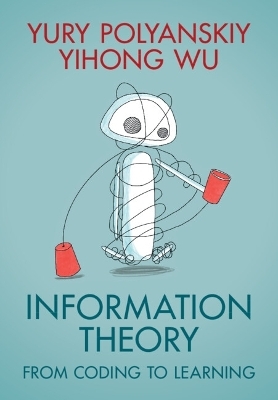
Information Theory
Cambridge University Press (Verlag)
978-1-108-83290-8 (ISBN)
- Noch nicht erschienen (ca. Januar 2025)
- Versandkostenfrei
- Auch auf Rechnung
- Artikel merken
This enthusiastic introduction to the fundamentals of information theory builds from classical Shannon theory through to modern applications in statistical learning, equipping students with a uniquely well-rounded and rigorous foundation for further study. Introduces core topics such as data compression, channel coding, and rate-distortion theory using a unique finite block-length approach. With over 210 end-of-part exercises and numerous examples, students are introduced to contemporary applications in statistics, machine learning and modern communication theory. This textbook presents information-theoretic methods with applications in statistical learning and computer science, such as f-divergences, PAC Bayes and variational principle, Kolmogorov's metric entropy, strong data processing inequalities, and entropic upper bounds for statistical estimation. Accompanied by a solutions manual for instructors, and additional standalone chapters on more specialized topics in information theory, this is the ideal introductory textbook for senior undergraduate and graduate students in electrical engineering, statistics, and computer science.
Yury Polyanskiy is a Professor of Electrical Engineering and Computer Science at the Massachusetts Institute of Technology, with a focus on information theory, statistical machine learning, error-correcting codes, wireless communication, and fault tolerance. He is the recipient of the 2020 IEEE Information Theory Society James Massey Award for outstanding achievement in research and teaching in Information Theory. Yihong Wu is a Professor of Statistics and Data Science at Yale University, focusing on the theoretical and algorithmic aspects of high-dimensional statistics, information theory, and optimization. He is the recipient of the 2018 Sloan Research Fellowship in Mathematics.
Part I. Information measures: 1. Entropy; 2. Divergence; 3. Mutual information; 4. Variational characterizations and continuity of information measures; 5. Extremization of mutual information: capacity saddle point; 6. Tensorization and information rates; 7. f-divergences; 8. Entropy method in combinatorics and geometry; 9. Random number generators; Part II. Lossless Data Compression: 10. Variable-length compression; 11. Fixed-length compression and Slepian-Wolf theorem; 12. Entropy of ergodic processes; 13. Universal compression; Part III. Hypothesis Testing and Large Deviations: 14. Neyman-Pearson lemma; 15. Information projection and large deviations; 16. Hypothesis testing: error exponents; Part IV. Channel Coding: 17. Error correcting codes; 18. Random and maximal coding; 19. Channel capacity; 20. Channels with input constraints. Gaussian channels; 21. Capacity per unit cost; 22. Strong converse. Channel dispersion. Error exponents. Finite blocklength; 23. Channel coding with feedback; Part V. Rate-distortion Theory and Metric Entropy: 24. Rate-distortion theory; 25. Rate distortion: achievability bounds; 26. Evaluating rate-distortion function. Lossy Source-Channel separation; 27. Metric entropy; Part VI. : 28. Basics of statistical decision theory, 29. Classical large-sample asymptotics; 30. Mutual information method; 31. Lower bounds via reduction to hypothesis testing, 32. Entropic bounds for statistical estimation; 33. Strong data processing inequality.
| Erscheint lt. Verlag | 2.1.2025 |
|---|---|
| Zusatzinfo | Worked examples or Exercises |
| Verlagsort | Cambridge |
| Sprache | englisch |
| Maße | 182 x 261 mm |
| Gewicht | 1780 g |
| Themenwelt | Mathematik / Informatik ► Informatik ► Theorie / Studium |
| Technik ► Nachrichtentechnik | |
| ISBN-10 | 1-108-83290-3 / 1108832903 |
| ISBN-13 | 978-1-108-83290-8 / 9781108832908 |
| Zustand | Neuware |
| Informationen gemäß Produktsicherheitsverordnung (GPSR) | |
| Haben Sie eine Frage zum Produkt? |
aus dem Bereich


